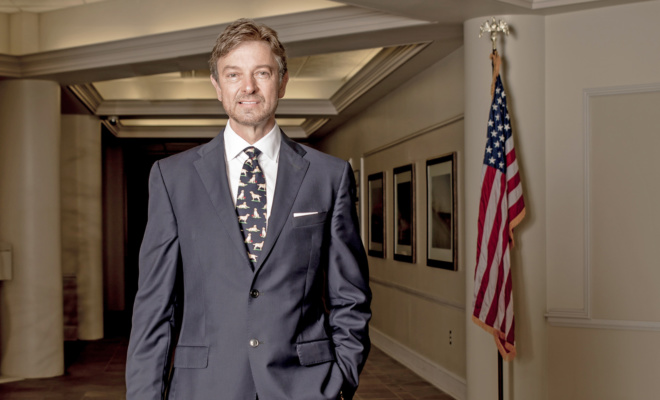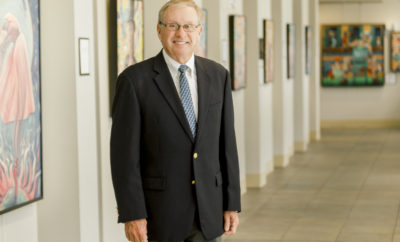
Philanthropy
An Ambassador for Freedom, Courage & Confidence
Bob Meade & Southeastern Guide Dog
Bob Meade’s first paying job was digging ditches for the Kentucky/West Virginia Gas Company. Soon after, he attended to the University of Kentucky, becoming the first person in his family to attend college. Along the way, he developed a sincere interest in being part of the medical profession. Today, he’s the CEO of Doctors Hospital, a position he’s held for the past 11 years. One of the things he’s most proud of about his workplace is ITS deep commitment to Southeastern Guide Dogs.
Southeastern Guide Dogs was founded in 1982 in Palmetto, and since then, they’ve created nearly 3,000 transformational partnerships with visually-impaired people and veterans. They currently have more than 450 canine graduates across the U.S., and they continue to place more than 100 dogs each year with people in need. All of Southeastern Guide Dogs’ guide and service dogs are provided for free, despite the tens of thousands of dollars and countless hours of training each Labrador retriever, golden retriever, or a blend of the two called goldador, requires.
Because they don’t use government funding, Southeastern Guide Dogs relies on other avenues of support. A primary source is their Philanthropic Partners program, which includes such entities as Doctors Hospital, JCI Jones Chemicals Inc., IHeartMedia, Publix, and Subaru, among other companies. These community-conscious companies feel the partnerships are win-win. Southeastern Guide Dogs receives financial and volunteer support, and in return, the partners are recognized for their support of Southeastern’s mission, while building their brand through exposure, recognition, and general goodwill.
Doctors Hospital’s partnership with this 501(c)(3) nonprofit organization “fits in nicely with what we try to do here, which is to improve lives,” explains Meade. While he’s been a dog lover all of his life — he had Labs as a kid, and currently has two Labs, including one that’s an ambassador dog from Southeastern Guide Dogs — he became interested in this organization when he looked out the hospital window one day and saw a volunteer driving a patient across the parking lot in a golf cart. The other passenger? A Lab.
This particular volunteer also served as a puppy raiser for Southeastern Guide Dogs, a job that entails fostering prospective guide dogs at home for 12 to 16 months. Taking them everywhere enables the animals to become socialized and acclimated to a wide variety of experiences prior to beginning the rigorous harness training every guide dog undertakes. Soon after this, Meade took the tour at Southeastern Guide Dogs and from then on, he’s gotten more and more involved. “I witness the number of individuals and see the absolute difference in their lives. Prior to getting a dog, so many had lost confidence. They didn’t want to go out. But with a dog? They’re entirely different people.”
Meade points out that many of his employees support Southeastern Guide Dogs. Many participate in the organization’s nine 3K Walkathon fundraisers. Others supported the Superheroes on Parade campaign. They all love the whimsical, prize-winning Superhero dog sculpture Doc, sponsored by and on display at Doctors Hospital. There are also Southeastern Guide Dogs four-legged visitors on the fourth floor that lend their soothing, warm personalities to patients. And Meade attends the organization’s meaningful fundraisers. He particularly appreciated the Dining in the Dark event, where, like all the other diners, he donned a blindfold and ate dinner without being able to see. “It gave us the perspective of what it’s like for a blind person to do something as seemingly simple as have a meal. Food was everywhere!” He points out that if just having a meal without one’s sight is hard, then think about trying to navigate going outside on your own. Having a guide dog often makes the difference between choosing to go out and engage with the world or just sitting home alone.
Despite all the nonprofit has done, Meade says that “up until the last few years, they’ve been one of the best-kept secrets in the area. There was always national attention because of the good work they do.” But thanks to quality leadership and people like Meade — who now serves on their board — spreading the word, more and more locals know about Southeastern Guide Dogs and the growing needs they fulfill. Considering that 300,000 to 400,000 U.S. veterans are diagnosed with post-traumatic stress disorder each year, being matched with a highly-trained service dog can be a godsend. They can create a physical buffer for the person when out in public. They can wake a veteran from a nightmare. Plus, caring for a dog can reduce a PTSD sufferer’s need for anti-anxiety medicine.
Taya Kyle, widow of Navy SEAL sniper Chris Kyle — whose story was made famous by Clint Eastwood’s movie American Sniper — was at her breaking point after her husband’s death. What got her through it was Norman, an emotional support dog provided free of charge by Southeastern Guide Dogs this past June. And it has done wonders for the well-being of her family. “If anyone ever doubts the value that Southeastern Guide Dogs brings to people,” she said when visiting our area in November, “remind them of my story.”
Southeastern Guide Dogs relies on fundraising events and the gifts of thousands of philanthropic individuals and businesses such as Bob Meade and Doctors Hospital. They have become some of the most powerful ambassadors one can ask for. They demonstrate their giving hearts and love for community, and make it possible to provide life-changing services to those who need them. “We are grateful for the example that Bob Meade and Doctors Hospital set for the community in the way they are participating in our Philanthropic Partners program and more,” says CEO Titus Herman. “By sponsoring Southeastern Guide Dogs’ key fundraising activities over the course of the year, they demonstrate their commitment to improving the lives of those who cannot see, and those who have seen too much. All while letting patients, doctors, staff members, vendors and community leaders know that good things come from being consistently charitable.”
“There are so many worthwhile organizations in our community,” admits Meade, “but this one is special. It fits with our culture here at Doctors Hospital as well as with our culture in Sarasota. It’s something we should all be proud to support.”
For more information on Southeastern Guide Dogs or their Philanthropic Partners program, please visit guidedogs.org or call 941.729.5665.






You must be logged in to post a comment Login